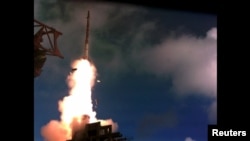A new Israeli air defense system being developed in partnership with the United States met all its objectives in a series of recent live interception tests, U.S. and Israeli officials said Wednesday, putting it on course for deployment by next year.
The system, David's Sling, shot down targets simulating longer-range missiles like Scuds that could be fired at Israel from Syria and by Lebanon's Iranian-backed Hezbollah guerrillas.
Defense sources said the more recent tests took place last week and on Tuesday. The latter coincided with international negotiations on Iran's disputed nuclear program that have drawn censure from Israeli Prime Minister Benjamin Netanyahu and in turn soured his relations with U.S. President Barack Obama.
Moshe Yaalon, Israel's defense minister, cited David's Sling as a mark of the continued vigor of the Israeli-U.S. alliance.
“We believe that next year it [David's Sling] is going to be operational,” Yaalon told visiting U.S. House of Representatives Speaker John Boehner, and added thanks for Washington's funding.
David's Sling and its Stunner interceptor missiles successfully hit “threat representative targets” in the tests, said Rick Lehner, spokesman for the U.S. Missile Defense Agency, which carried out the third series of tests of the system together with the Israel Missile Defense Organization (IMDO).
“This ... is a major milestone in the development of the David's Sling weapon and provides confidence in future Israeli capabilities to defend against the developing threat,” he said.
MDA Director Vice Admiral James Syring said Washington was pleased with the test results and vowed to continue U.S. assistance to Israel's missile defense technology efforts.
Known in Hebrew as Magic Wand, David's Sling is being developed and manufactured jointly by Israel's state-owned Rafael Advanced Defense Systems Ltd and Raytheon Co, a top U.S. arms maker.
Designed to shoot down rockets with ranges of 100 km to 200 km (63 miles to 125 miles), aircraft or low-flying cruise missiles, David's Sling will fill the operational gap between Israel's Iron Dome short-range rocket interceptor and the Arrow ballistic missile interceptor, both already in service.
The latest successful tests are likely to strengthen support among U.S. lawmakers for Israel's request for additional funds.
Israeli officials last month asked Congress for an additional $317 million for David's Sling and other Israeli missile defense programs, on top of $158 million already requested by the Obama administration in its fiscal 2016 budget.
Fuelling the sense of urgency around David's Sling development, Israeli media on Wednesday published military assessments that, in the next war with Hezbollah, the guerrillas could rain up to 1,500 rockets on Israel daily, killing hundreds of civilians.
The latest tests were conducted under unusually strict secrecy, and had been rescheduled at least once. One date that had been considered, planners said, was March 3 - hours before Netanyahu, at Boehner's invitation, gave a speech at the U.S. Congress that both praised Obama for supporting Israel's security but rebuked him over the nuclear diplomacy with Iran.
David's Sling was first tested on Nov. 25, 2012, shooting down a simulated rocket. It experienced an early setback when a Nov. 18, 2013 trial failed because of a faulty sensor setting, a person who was present told Reuters. But all other interception tests have been successful, Israeli and U.S. officials said.





